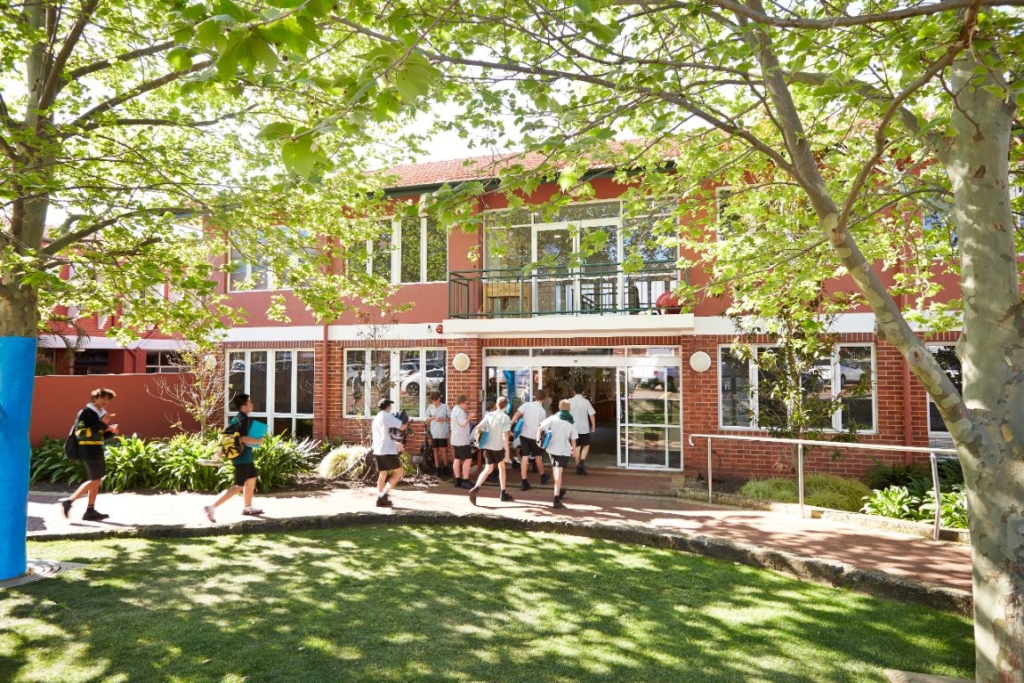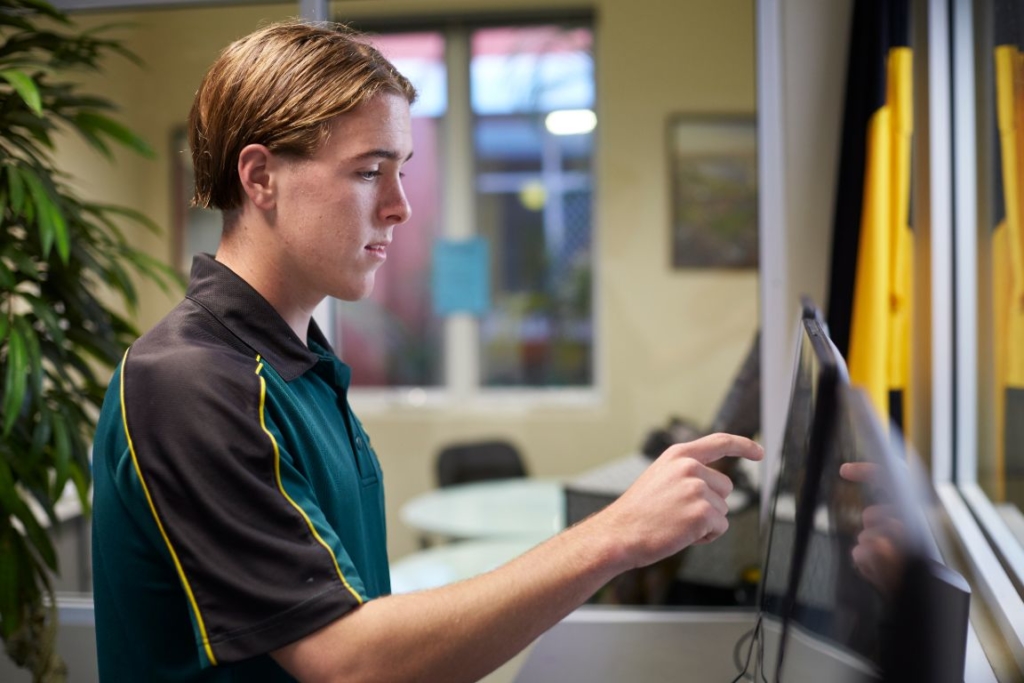Choosing to send your child to boarding school is a tough decision, especially with a countless number of boarding schools in Western Australia. This guide should help.
Whether you’re interested in boarding at Wesley College or looking at a range of options, this guide will provide you with a list of the most important factors to consider while choosing between boarding houses. This will assist you in making the right decision for you, your family and, most importantly, your child.
Let’s begin with some basics. You’re going to start with a range of schools that you feel could be serious contenders. So you’ll be wanting to get a quick overview of their facilities and values so you can quickly find the one or two boarding schools that would best suit your child.
To make the initial cull, spend a little time doing the following:
- Speak to students and parents of the school, both past and current: how do the students carry themselves? What are their views on the school? Have they enjoyed the experience?
- Check the website: gather as much information as you can. Focus on the factors that matter the most to you and your family.
- Follow their social media pages: get daily updates on what is happening at the school.
- Attend a field day: speak to a representative of the different schools to get an initial feel for what they are like.
- Book a tour: meet with the leaders and staff of the school (and boarding house) to gain a better understanding of whether you and your child’s needs will be met.
- Do the maths: you need to ensure that the financial risk that you will be undertaking is worthwhile. Consider factors such as the travel time and costs, access to scholarships and bursaries as well as the overall fees and what they include.
Once you’re down to a couple of options, it’s time to really look deeply into what those schools offer. As the 2019 Boarding School of the year, we know what it takes to offer an incredible boarding program, and we want to help all parents select the best possible school for their children.
Below you’ll find our guide of the 10 most important factors to consider when looking for a boarding school for your child(ren).

A Wesley College Boarder
The 10 factors you need to consider before making your choice
1. Location
Western Australia is a big state… there are plenty of boarding schools to choose from! Before you decide, it is important to consider which area of the state (or the country) you would like your child to be in. There are three major factors to discuss when considering the location of your child’s boarding school:
- Safety
Would you feel comfortable with your child roaming the streets surrounding the boarding house of your choice? Do you have faith in the public transport system that your child would be using?
- Transport
How easy will it be for your child to get to and from the boarding house during holiday breaks? Will your child have access to public transport to get to and from sporting games or training and any other activities? Do you have any family or friends close to the school that can visit your child on weekends or care for them when they are sick or injured and cannot remain in the boarding house? Will you be able to make the trip to the school for special occasions like graduation days?
- Amenities
How close is the boarding house to shopping outlets, cafes and community sport grounds? Are there local parks and rivers for your child to explore? Where do the school’s boarding students tend to hang out when they’re off-site – are you happy with that location?

The Boarding House at Wesley College
2. Community
The power of a diverse and inclusive community cannot be understated. Placing your child in an environment filled with students and staff from a wide range of backgrounds can be incredibly valuable; he or she will be exposed to new lifestyles, languages and traditions, which – in turn – will help transform them into an active-minded and global citizen.
This notion of community is determined by the levels of engagement and interaction between parents and staff. You need to ask yourself, how can parents connect with each other? Does the boarding house calendar offer opportunities for relationship building? The chance for families to interact is invaluable as you will be able to watch your children grow up together. You want to be able to cry together, laugh together and grow together as parents. Not only will your children be making lifelong friendships, but you will be too. That’s pretty special!

Head of Boarding at Wesley, Mr Rod Steer
3. Ethos and philosophy of the school
Every single school will have their own ethos and philosophy in regard to how young men and women should be brought up and what sort of values they should have instilled in them. Furthermore, there are several questions that you must consider:
- Does the school promote the values that are most important for you and your family?
- How does the school (and boarding school) discipline their students?
- What forms of anti-bullying practices are in place?
- What religion, if any, does the school practice?
- Are there any platforms of support in place for when your child may be struggling physically, mentally or emotionally?
These questions, of course, are very broad. It is often hard to get a gauge on these things unless you are a current parent of a child at the school. As such, there are little things that you should search for when browsing school websites or when touring a school. How do the students address the staff – is it on a first name basis? How warm is the welcome through the front doors? A helpful tip is to look for the little things that you value in your own home.

Students working together
4. Academics
You need to evaluate whether the school (a) offers the classes that your child would be interested in and (b) has an academic level and/or culture that will be sufficient for your child.
Be prepared to query whether the school will challenge and extend your child’s capabilities. This may include looking into the presence of streamed courses, how grades are determined and how assessments will be conducted.
With a specific focus on boarding schools, you must discover the amount of time and resources that are given to academics in the daily program. For example, are there times set aside for study on school nights? Will your child have access to tutors or support when they struggle with their work?
It is often the case that students from rural or international backgrounds will arrive at a boarding school with a different level of academic experience than those from the local area. Therefore, it is important to consider whether the school you are choosing will have methods in place to make for a smooth transition from one school to another for your child.

A study space in Wesley’s Boarding House
5. Staff/Teachers
In deciding to send your child to boarding school, you must be prepared to be away from them for over 30 weeks of the year. Furthermore, the boarding house staff will largely become the second tier of role models in the life of your child.
You must be prepared to trust them in providing your child with valuable guidance and support in this crucial period of their upbringing.
It is often the capacity of boarding house staff to facilitate a caring and nurturing environment that makes the difference between a mediocre boarding house and a great one.
You should strive to send your child to a boarding school with a diverse staffing group as only then can you be sure that your child will find someone they confide in on their tough days. When touring schools and meeting staff, you need to observe how they carry themselves and what sort of messages they present.

Wesley’s teachers are world-class
6. Facilities
As the boarding house will become the ‘second home’ for your child, it is important to consider the quality of the facilities that are offered. You must be prepared to ask yourself the following questions:
- Is the boarding house secure (e.g. will your child be safe and supervised)?
- Will your child feel comfortable here? For example, you may be inclined to look at the layout of the dormitories and the degree of privacy that is offered.
- How will your child clean their clothes (e.g. is there a laundry and do the students use it themselves)?
- Are the facilities clean and well managed?
- Will your child have access to medical assistance if required?
- Will your child have access to the internet and technological devices? If so, how will their use be monitored?
- When and how often will students be able to call home?
- Is the cafeteria menu nutritious and will your child enjoy the food? Will all dietary requirements be met? Does the food ever run out? Can a meal be ordered if a child misses the allocated eating time?
The ‘facilities’ factor isn’t represented by the boarding house alone. You must also consider other parts of the college campus that may add to your child’s experience. For example, the following additions can be incredibly valuable for keeping your child occupied:
- Sporting grounds e.g. tennis and basketball courts
- A gym and/or fitness centre
- A swimming pool
- A music room
- A play/games room

Wesley’s dorms include a pool table and Xbox
7. Recreational and co-curricular activities
Modern day boarding schools have become increasingly more concerned with student well-being; staff are constantly searching for ways to stop students from being ‘bored’!
As such, the inclusion of recreational and co-curricular activities have become incredibly important for any boarding house program. These activities provide students with the chance to have fun and extend themselves.
In terms of co-curricular activities, you must consider the following points:
- Will your child have the chance to play a sport that they are passionate about?
- Does the school offer opportunities for your child to extend themselves in the arts (e.g. music, drama and photography)?
- Will your child have the ability to play with local community sporting or music groups? What is the boarding house’s philosophy when it comes to this?
- Will students have access to ATMs or can parents transfer money for spending on recreational activities?
- How do students get to and from events? Is there a boarding shuttle bus? Are taxi vouchers handed out?

After-school activities cover more than just sport!
8. How much does boarding cost?
When considering the best boarding school for your child, it is likely that you will make direct comparisons between your preferred options. In weighing up the pros and cons, you will need to consider the factor of price.
In looking at the cost of boarding in WA, it is advised that you gain access to the latest fees schedule and look closely into every detail of the costings. Ask yourself what the school fees include and what the school fees don’t include – as often some additions are not accounted for in the annual fees (e.g. are uniforms and recreational activities accounted for in the fees).
With this in mind, it is often possible for students to gain access to scholarships and bursaries. These can relieve significant financial pressures for parents and can be gained through special consideration or through outstanding potential in academics, the arts or sport.

The boarder’s canteen at Wesley College
9. How it all works
When considering the right school for your child to board in, don’t forget to think about the boarding house dynamics and how they will influence your child’s upbringing. These dynamics include:
- Pastoral care
Are you comfortable with the support networks that your child will be receiving in your absence? How will those responsible for the pastoral care of your child get in touch with you?
- Communication with parents
Does the school utilise weekly newsletters? Do parents have the opportunity to arrange meetings with staff members? How do parents remain informed in regards to the academic performance of their child?
- Student gender
Will your child thrive in a single-sex environment or would you prefer for them to attend a co-educational school? How would those in a co-educational school be organised in terms of dormitories and privacy?
- Boarding to day student ratio
Does the school only have boarding house students or are there local students who attend? For example, the presence of local students can be beneficial on weekends as the boarders may be able to spend time with ‘host’ families from the local area.
- Dormitory and room arrangements
How are sleeping spaces and bathrooms organised? Will students be able to choose who sleeps in the rooms next to them? Do you want your child to have their own room or share with others? Is the large dormitory-style, quads, pairs or single rooms more suited for your child?
- Size of the school and the boarding house
Does your child thrive in smaller classes? Will they be overwhelmed by moving from a small community to a large one?
- Proximity
How far is the boarding house from the school? How easy is it for students to get to class?
- Leave arrangements
How do the staff manage their duty of care? How easy is it for your child to organise weekend activities? How is leave managed so that your child’s safety is ensured? What is the school’s system for knowing the whereabouts of your child at any point in time? How easy is it for parents to give permissions for their child to partake in certain external activities?
- Student intake
Will your child be joining the school at a time when other new students are? What are the intake years? Will your child be given a mentor or a current student to help them settle in?
- Student background
Will there be students from a similar background to your child? How many international students are there?

An electronic system allows boarders to check themselves in and out of the Boarding House
10. Your child’s opinion
You – as parents and those paying the school fees – have the final say, but it is important to consider what your child thinks.
There are some fantastic stories of students who have toured a school and said ‘yep, this is where I want to go’ and have loved their schooling journey. It is definitely possible for a child to pick-up on the ‘vibe’ of a school and whether it aligns with who they are as a person.
To involve your child in the decision-making process, make sure to ask them plenty of questions. Did they like the facilities? What did they think of the staff they met? What was the initial review of the ‘vibe’ like? By involving your child in this process it is more likely that they will feel comfortable when the dreaded ‘first-day’ arrives.
Feeling stressed?
After reading through all of those points, you may currently be feeling overwhelmed at the decision you have to make. Don’t be! At the end of the day, the choice to send your child into boarding can be an incredible one.
Boarding house students are gifted with the opportunity to live in 24-hour communities with exceptionally diverse set-ups.
That’s what is so special about boarding. Students are embedded in a close-knit community and are able to develop long-lasting friendships. They will develop self-awareness and incredible inter-personal skills.
This is tied in with a greater sense of independence and improved time management. Undoubtedly, the time your children will spend away from home will be made up for in the incredible personal growth that they will show throughout their schooling journey.
Subscribe to Wesley College News & Events